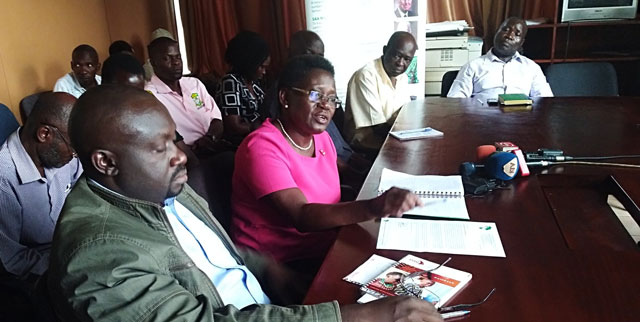
Kampala, Uganda | THE INDEPENDENT | The government has been asked to help the farming community to devise ways of mitigating the challenges of climate change, which they say is becoming a major challenge to the sector.
Climate change is not only affecting the environment and soil fertility but making it harder especially for rain-fed agriculture which Uganda relies on.
This came out as Sasakawa Africa Association (SAA), a farmer promotion NGO, discussed their new 5-year strategic plan 2021-2025.
Sasakawa Africa works in close collaboration with the ministries of Agriculture in Uganda, Ethiopia, Mali and Nigeria, to support smallholder farmers along the agricultural value chain. Its aim is to increase farmers’ income and food and nutrition security through promoting market-oriented, sustainable, resilient, regenerative and nutrition-sensitive agricultural innovations, and building the capacity of Extension Agents and farmers.
Roseline Nyamutale, the SAA Country Director in Uganda says the new challenge relating to climate is now the uncertainties it comes with. This, she says, makes it hard to plan for their farms, as unlike before they can no longer know when to plant, for example, and there is a need to find ways of predicting seasons early enough.
The farmers also complained of, among other things, the ineffective agriculture extension services in the country, where the majority rely on their own knowledge, experience and tradition. This, according to Sasakawa is not sustainable.
Deus Muhwezi, the Director for Extension Services at the Ministry of Agriculture, Animal Industry and Fisheries, agreed that extension services are not in every place where they are needed. Muhwezi says there are inefficiencies in input access services, promotion of value addition and mechanization, and that this calls for new innovative ways of reaching the farmers.
However, apart from innovation, Muhwezi challenged the farmers to focus on quality and their ability to sustain the supply that the market needs, otherwise the markets will be lost. He says the farming community has challenges accessing the local and international markets which they can work on, including volumes and quality.
He gave the example of ginger farmers in Butambala who perfectly supplied a market in the middle east in the first consignment but lost the market after failing to meet the volumes for the second shipment.
However, the farmers and traders feel the government has to do more including working on their policies to respond to new challenges, especially in the new export markets. Apart from meeting the standards requires, for example, they say there is a need to improve on the seed quality and quality seed volumes, which will ensure sustained supply to those markets.
Stephen Wakweya, founder of Fresh Horizons Ltd says for example that they have secured markets as far as the Congo Brazzaville and local brewers, for cassava products, but they need a good seed supply system that the government can provide.
The 5-year strategic plan has three main pillars including “Sustainable Resilient and Regenerative Agriculture” in response to soil degradation. This pillar focuses on techniques and practices that are aimed at restoring soil nutrients and preventing further degradation.
“Regenerative Agriculture supports biodiversity, enriches the soil, improves watersheds and increases the capacity of the soil to capture carbon. Its effective implementation is expected to contribute towards increasing the food nutrition, and income security of smallholder farmers,” states the strategy.
The plan also focuses on Nutrition-Sensitive Agriculture for Children and Adults Health, which aims at ensuring children especially in farmer’s households, have access to acceptable nutrition.
“Nutrition-sensitive agriculture is a food-based approach to agricultural development that puts nutrition-rich foods, dietary diversity and food fortification at the heart of overcoming malnutrition and micro-nutrient deficiencies,” it says.
In Uganda and most African countries, it is common, according to reports, to find children in farming communities as most affected by malnutrition. The third pillar of the strategic plan is Market-Oriented Agriculture for securing farming as a business.
Apart from improving farmer household incomes, this pillar also aims at not only finding markets but also ensuring ways of sustaining them. This will also involve ‘bringing the markets closer to the farmers’ through using modern marketing and distribution technologies.
According to Dr Mel Oluoch, the Regional Director for Eastern, the strategic plan will see improvement in the general livelihoods of farmers including in terms of incomes and health, while also supporting the economy through sustained markets.
****
URN
 The Independent Uganda: You get the Truth we Pay the Price
The Independent Uganda: You get the Truth we Pay the Price



thanks